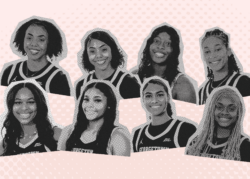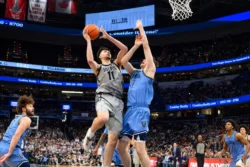Last year, stunningly talented center Greg Monroe shattered the blue and gray hearts of Georgetown fans when he opted to leave for the NBA after his sophomore season. The talent drain potentially hit the Hilltop again last week, when emerging swingman Hollis Thompson declared for the draft after just two seasons with the Hoyas. Unlike Monroe, Thompson has not hired an agent, which makes him eligible to return to campus if he withdraws his name from the draft by May 8, so there’s a chance we may see Thompson on the Verizon Center court next season.
Nevertheless, Thompson’s unexpected declaration raises an important concern about the effect that the allure of massive professional contracts has had on college basketball. While the NBA has experienced a resurgence in the overall talent level and number of stars in the league over the past few years, college basketball is suffering, as promising players forgo their last few seasons of NCAA eligibility for a shot at the pros. One only has to look back to this season’s shockingly awful final between Butler and Connecticut to see that the talent pool in the NCAA is as weak as it has ever been.
Georgetown offers perhaps one of the best examples of how the increase in early entrants has robbed fans of some exceptional teams. The Hoyas used to be known for graduating their athletes, with Allen Iverson being the only player in the John Thompson Jr. era to depart early for the NBA. Since John Thompson III took over his dad’s old job, Jeff Green, DaJuan Summers, and Greg Monroe have all left promising teams for an NBA contract.
Many players make the premature jump from student-athlete to professional very successfully. Green and Monroe were both selected early in the first round and have established themselves as valuable players in the league. For every success story, however, there are several cases of failure and underachievement. Summers, for example, fell to the second round of the draft and has been unable to secure a spot in the struggling Detroit Pistons’ rotation.
Still, it’s often problematic to judge a decision to enter the draft purely on a player’s subsequent professional achievement. For most prospects, the decision is made (quite understandably) for financial reasons, not because of an inflated ego or distaste for college life. Without knowing the financial pressures on a particular student-athlete, it’s difficult to fault a player for pursuing a multi-million dollar contract.
When a budding college star bolts for the NBA, though, he not only deprives his school of another season of his services—he misses a crucial opportunity to build on aspects of his game that cannot be taught at the next level. While certain skills can be learned in NBA practice facilities, important mental aspects of the game, like confidence and leadership, can only be acquired through game experience, something that is difficult for early draft entrants to come by in their preliminary seasons in the league.
Atlanta Hawks forward Marvin Williams, who entered the league after his freshman season at UNC, is a perfect example of this phenomenon. Drafted second overall in 2005, Williams has failed to make an impact in the NBA, never really progressing from the sixth man role he held on the talent-loaded Tar Heels. Perhaps another season at UNC as the team’s go-to player would have allowed Williams to develop a more aggressive mentality and ultimately led to a more memorable NBA career.
With no hopes of a first round selection and plenty left to prove at the collegiate level, Hollis Thompson’s decision to leave early for the NBA is simply nonsensical from a sporting or financial standpoint. When Williams ditched UNC for the draft, he was at least guaranteed a sizeable rookie contract. Thompson, meanwhile, will be fortunate to even make an NBA roster at this stage in his development. As fans of both Georgetown basketball and Hollis Thompson, we can only hope that he reverses his decision and continues to improve his game with the Hoyas for at least one more season.





